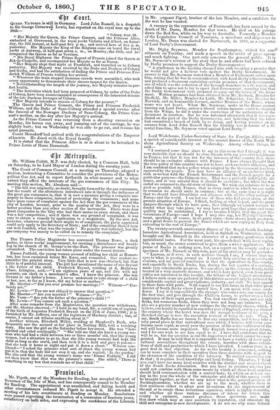'jr alttrupplis.
Mr. William Cubitt, M.P. was duly elected, by a Common Hall, held on Saturday, to be Lord Mayor of London during the ensuing year.
The Court of Common Council, at a meeting on Thursday, adopted a motion, instructing a Committee to consider the provisions of the Metro- politan Gas Act, and to report forthwith in what manner and to what extent they affect the interests of the gas consumers of this City. In moving this motion, Mr. Abraham said—
"The bill was originally, no doubt, brought forward by the gas consumers, but the result of the alterations introduced into it through the influence of the great gas companies is, that it is now a measure giving a complete mo- nopoly to those companies, instead of protecting the consumers ; and none have more cause of complaint against the Act than the gas consumers of the city of London, because, prior to the passing of the Act, they were in a better position than any other section of the metropolis. There were four great companies in the City who had their mains in every street, and there was a fair competition ; and if there was any ground of complaint, it was easy to obtain a remedy by application to a magistrate. By the new Act, however, whatever ground there might be of complaint, the party aggrieved could only apply to the Secretary of State ; and if the complaint should turn out well founded, what was the remedy ? No penalty was inflicted, but the gas company was merely to be called on to remedy the complaint."
The Thames Police Magistrate has sentenced Thomas Rowe, a dock porter, to three weeks' imprisonment, for creating a disturbance and brawl- ing in the church of St. George's-in-the-East. The prisoner was greatly astonished. The conviction has taken place under the recent statute.
Emma Padfield, the young woman accused of killing her child at Homer- ton, has been examined before Mr. Knox, and remanded. Our readers re- amember the painful story. Very little that is new was obtained, but that little is of painful interest. The girl had mentioned the name of one Bryant s the father of the child. Frederick Bryant, residing at 6, Holloway Place, Islington, said,—"I am eighteen years of age, and live with my sparents, am clerk in a merchant's office. I know the prisoner. She was fervent at my father's house. I never undertook to take charge of a child or her, nor, so far as I know, did my father or mother." Mr. Shorter—"Did you ever promise her marriage ?" Witness—" Cer- tainly not."
Mr. Lewis—" Yon are not obliged to answer that question." Mr. Shorter—" Are you married ?" Witness—" No." Mr. Vann—" Are you the father of the prisoner's child ? " Mr. Lewis—" You cannot ask such a question." After some remarks from the Magistrates, the question was withdrawn, and Mr. Shorter observed—" I hold in my hand, Sir, a certificate of register of the birth of Augustus Frederick Bryant on the 27th of June, 1860 ; it is furnished by Mr. Jeffreys, one of the registrars of Hackney district ; but, of course, I cannot ask witness anything about it."
Another witness, Elizabeth Miller, residing at Shepherd's Bush, who frequently saw the accused at her place in Notting Hill, told a touching stOry. She saw the girl on the Saturday before her arrest. She was "low- spirited and cried continually." " She told me that she knew a young wo- man who had had a child between two or three months' old, that the young woman, had a situation to go to, that she (the young woman) had kept the child as long as she could, and then took it to a field and gave it poison— that she took it home at night and put it down a closet.', Witness con- tinued—" leaked the prisoner what sort of closet the young woman had put it in that the body did not stop it up, and she replied, In the garden.' She also said that the young woman's name was 'Emma Padfield.' I did not then know that that was the prisoner's name. She added, There is something in my box that reminds me of that child.' "


























 Previous page
Previous page